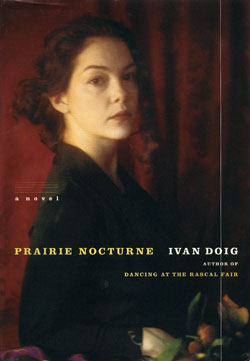Prairie Nocturne Synopsis
 Wesley Williamson is the business and political scion of a cattle-empire family. Wes--"incurably married," in Susan's phrase for him--was forced out of a governor's race, and his public career ended, by foes within his own party who uncovered his affair with Susan. One night in the mid-1920s, he says he has a singing pupil for her, whose tutelage he will pay. Susan studies Wes, the window behind him framing the state capitol dome and his limousine with his black chauffeur, Monty, waiting outside in the flurry of the winter's first snowfall, and she skeptically asks who in this world means that much to him. He looks stunned at her question, obviously not having thought of it that way, but he half turns toward the scene outside and tells her: "Monty."
Wesley Williamson is the business and political scion of a cattle-empire family. Wes--"incurably married," in Susan's phrase for him--was forced out of a governor's race, and his public career ended, by foes within his own party who uncovered his affair with Susan. One night in the mid-1920s, he says he has a singing pupil for her, whose tutelage he will pay. Susan studies Wes, the window behind him framing the state capitol dome and his limousine with his black chauffeur, Monty, waiting outside in the flurry of the winter's first snowfall, and she skeptically asks who in this world means that much to him. He looks stunned at her question, obviously not having thought of it that way, but he half turns toward the scene outside and tells her: "Monty."
The tantalizing melody of involvement that Wes inaugurates here, in Susan's nocturnal domain, pulses on into the saga of these three characters all the way from Montana's ins-and-outs of striving and power to New York and the Harlem Renaissance. Monty, fully named Montgomery Rathbun, is distantly known to Susan from their growing-up years in the Two Medicine country--he is the descendant of a "buffalo soldier," the black troopers sent west to fight Indians—and yet an enforced stranger because of the racial divide. When she realizes he possesses a singing voice of rare splendor, untrained but vibrantly born of spirituals, Susan joins Wes's Pygmalion-like project to launch Monty on a performing career. And so, from the political corridors and attained drawing rooms of Helena, by way of a harrowing scene of a snowed-in train on Wes's branch-line railroad in the Two Medicine country, the three go east to try to affix Monty's star in the musical firmament. Their crossed fates, as Susan and Monty must cope with their growing attraction to each other across the era's dangerous barrier of color, as the motives of Wes unsettle everyone including himself, make a deeply longitudinal novel, with everlasting questions of allegiance, the grip of the past, and the costs of love and career.
As with This House of Sky, this is a story whose shoulder I have peered over for most of my life. Monty's real-life counterpart, Taylor Gordon, was the only black man in my Montana hometown and his singing voice did carry him to Harlem, and for that matter Carnegie Hall, briefly in the 1920s. I tape-recorded his memories of those times not long before he died, familyless, in 1971, and his papers and other Harlem Renaissance archival holdings are rich with detail. The baronial West, the Wesley Williamsons of the world, I see as a haunting counterpoint to a life such as Monty/Taylor's, endowed with simply talent. As for Susan Duff, who is the prism and distinctive sensibility of this novel, she first came into my pages as a bossy indomitable schoolgirl with a silver voice of her own in Dancing at the Rascal Fair and has demanded her own book ever since. This trio forms the central cast of characters of Prairie Nocturne.
For help on locating this book, refer to the Purchase section.
Synopsis | Discussion Points | Background Notes